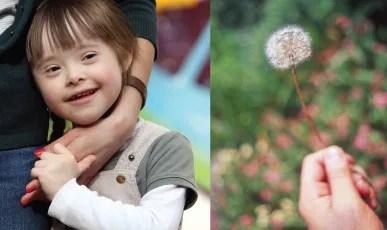From the fall/winter 2012 issue of Special Parent magazine, a selection of thought-provoking, laugh-inducing, or plain interesting thoughts from the web and the world of special parenting.
|
“Here’s what I think: the only reason I’m not ordinary is that no one else sees me that way.” —Auggie Pullman, the 10-year-old narrator who was born with a facial deformity preventing him from going to a mainstream school, in the young adult novel “Wonder,” by R.J. Palacio (@RJPalacio), who lives in NYC with her husband and two sons; “Wonder” is full of heart, hope, and empathy—or, as the author calls it, “a meditation on kindness” (Knopf; ages 8-12) |
|
“Like so many decisions in our family, the easier road is often the one overgrown with weeds.” —Michaela Searfoorce, a former musician turned never-stay-at-home mother who is currently raising three exceptional children (one with significant special needs), ages 11, 3 and 1, with another on the way, in Brooklyn; she blogs at TheFoorce.com and also organizes monthly meetings geared toward the special needs community, runs a summer social skills group, and speaks at various local organizations and schools; read her contributions to “Special Parent” at nyspecialparent.com. |
| Moments Count “How do we go back to the idea that ordinary can be extraordinary? How do we teach our children—and remind ourselves—that life doesn’t have to be all about public recognition and prizes, but can be more about our relationships and special moments?” —Alina Tugend (@atugend) in “Redefining Success and Celebrating the Ordinary,” a thoughtful and not-so-ordinary Shortcuts column in “The New York Times” written in response to a graduation speech (“You’re Not Special”) that went viral: nymetroparents.com/grad-speech |
“I’m dyslexic and I have a learning disability. In school, I didn’t do well so I goofed off. But cooking gave me a direction and it gave me focus.” —Marc Murphy (@chefmarcmurphy), NYC-based celebrity chef and acclaimed restaurateur, on an episode of “Chopped All Stars,” on which he was competing for City Harvest (cityharvest.org); get expert tips on how to recognize dyslexia and what to do if you suspect your child is suffering at nymetroparents.com/dyslexia |
|
FOR YOUTH WITH ASD, DURING THE FIRST SIX YEARS AFTER HIGH SCHOOL: 34.7% had attended college 55.1% had held employment —per “Postsecondary Education and Employment Among Youth with an Autism Spectrum Disorder,” published in the June 2012 issue of “Pediatrics”; according to the study, youth with an ASD had the lowest rates of participation in employment and the highest rates of no participation compared with youth in other disability categories; read more at pediatrics.aappublications.org |
| “To be truly helpful to the child with special needs, we need to back off from trying to make the child do what he can’t do…No matter how much we may want to help, and no matter what our expertise, we are 100-percent dependent on the child’s brain to make the necessary changes.” —Anat Baniel (@anatbaniel), clinical psychologist, in “Kids Beyond Limits: The Anat Baniel Method for Awakening the Brain and Transforming the Life of Your Child with Special Needs” (Perigee), released in paperback earlier this year; learn more at anatbanielmethod.com |
|
“Like a race horse… |
| “Emma ate a slice of pizza last night.
|























